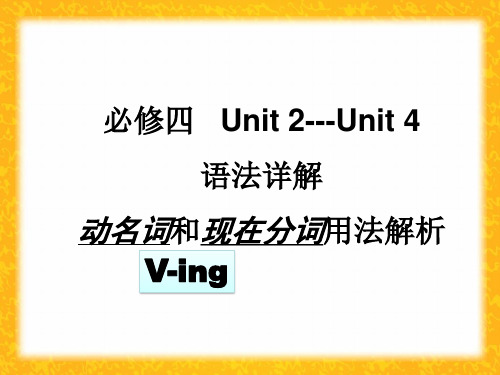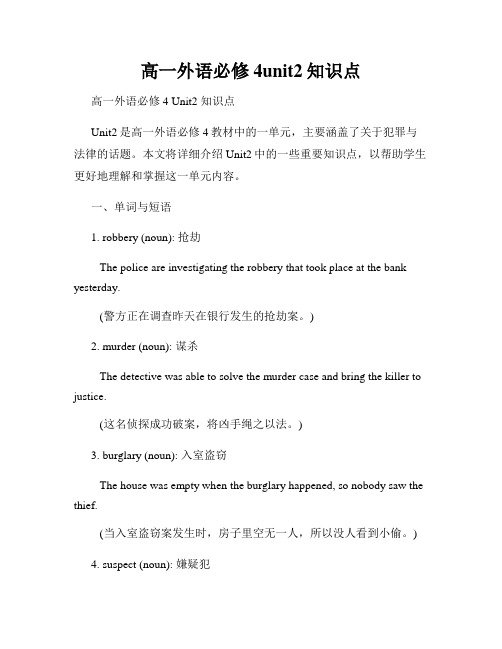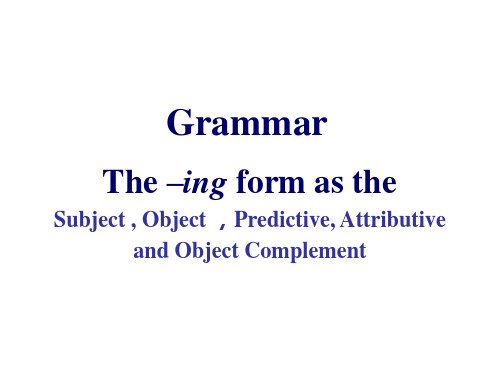必修四第二单元语法
人教高中英语必修4Unit2语法详解 (共46张PPT)

现在分词短语作状语现在分词短语作状语动名词短语作主语表语动名词短语作宾语现在分词短语作表语现在分词短语作表语现在分词短语作定语现在分词短语作定语现在分词短语作定语现在分词短语作定语语态时态主动形式被动形式一般式beingdone完成式nothavingdonehavingbeendone动词ing时态及否定形式?ving一般式表示这个动作正在进行或与谓语表示的动作同时发生
1)还是个孩子的时侯,她就觉得探视病人是一种责 任,也是一种愉悦。
As a child,she felt thatv_i_s_it_in__g_s__ic_k__p_e_o_p__lewas a duty and a pleasure.
2)到美国人家里做客对我来说将是一个极好的经历。
_T_o_b__e_a__g_u_e_s_tin an American home will be a good experience for me.
必修四 Unit 2---Unit 4 语法详解
动名词和现在分词用法解析
V-ing
•一、V-ing 形式概念 •(1) V-ing 形式包括两种: •①动名词:
具有名词特征,在句子中可作主语,宾语, 表语,定语等。
•② 现在分词: 具有形容词和副词特征,在句子中可作 定语、状语、表语、宾补
•Speaking in the public , he will surely be very cheerful .
foolish man.
②既可接动名词又可接不定式作宾语的动词,常见的有: begin,start,continue,like,love,prefer,by,mean, forget,remember,hate等。 A.在like,love,hate,prefer等动词之后,
]高二英语必修四第二单元语法课件
![]高二英语必修四第二单元语法课件](https://img.taocdn.com/s3/m/515310600b1c59eef8c7b487.png)
二、功能及用法(作主语)
动名词作主语与不定式作主语的区别:
动名词表示的动作通常是一个泛指的动作,不 定式则通常表示具体的动作。如:
1)还是个孩子的时侯,她就觉得探视病人是一种责 任,也是一种愉悦。 visiting sick people As a child,she felt that _________________ was a duty and a pleasure. 2)到美国人家里做客对我来说将是一个极好的经历。 ____________ in an American home will be a good Toexperience for me. be a guest
ቤተ መጻሕፍቲ ባይዱ
二、功能及用法(作主语) 3) 一直不做就是作恶。 Doing nothing ___________________is doing ill. 4)他说:“继续这样下去是无用的。” He said,“To go on like this is no use.” 5)我很荣幸被邀请参加这个晚会。 It’s an honor for me to be invited to the party.
Useful structure ( 30m )
一、动名词的形式
主动形式
一般式 doing having done
被动形式
being done having been done
完成式
二、功能及用法(作主语) 1.作主语. 动名词作主语时,句子有三种形式: ①动名词直接置于句首主语的位置上。 1) 捉弄别人是我们万万不能干的. Playing tricks on others _______________________ is something we should never do. 2)学习新单词对我来说非常重要。 Learning new words ____________________ is very important for me. 3)说比做容易。 Talking ___________ is easier than doing.
高一外语必修4unit2知识点

高一外语必修4unit2知识点高一外语必修4 Unit2 知识点Unit2是高一外语必修4教材中的一单元,主要涵盖了关于犯罪与法律的话题。
本文将详细介绍Unit2中的一些重要知识点,以帮助学生更好地理解和掌握这一单元内容。
一、单词与短语1. robbery (noun): 抢劫The police are investigating the robbery that took place at the bank yesterday.(警方正在调查昨天在银行发生的抢劫案。
)2. murder (noun): 谋杀The detective was able to solve the murder case and bring the killer to justice.(这名侦探成功破案,将凶手绳之以法。
)3. burglary (noun): 入室盗窃The house was empty when the burglary happened, so nobody saw the thief.(当入室盗窃案发生时,房子里空无一人,所以没人看到小偷。
)4. suspect (noun): 嫌疑犯The police arrested a suspect in connection with the robbery.(警方逮捕了一名与抢劫有关的嫌疑犯。
)5. evidence (noun): 证据The detective collected a lot of evidence at the crime scene.(这名侦探在犯罪现场收集了大量的证据。
)二、被动语态在Unit2中,我们需要掌握被动语态的用法。
被动语态是表示主语是动作的接受者的一种句式。
构成被动语态的基本结构为:“be + 过去分词”。
例如:Active: The police caught the thief.Passive: The thief was caught by the police.被动语态常用于描述某一行为的执行者不明确或不重要的情况下。
高中英语必修四unit2语法课件

二、动名词用作宾语 动名词作宾语有两种情况。 1. 只能后接-ing作宾语的动词, 常见的有 avoid, consider, enjoy, keep, finish, imagine, mind, suggest, advise, practise, feel like, dislike, can't help, fancy, escape, stand, be busy 等。 注意:have problem/difficulty/trouble/fun/a ... time+(in)doing
Don’t forget to write to your mother. I regret missing the report. I regret to say I can’t take your advice.
D. 意义各不相同 try to do 尽力做 mean to do 打算做 try doing 尝试做 mean doing 意味着做 be used to doing 习惯于做某事 be used to do 被用来做某事 can’t help doing 情不自禁做某事 can't help to do 不能帮助做某事 E. go on doing 继续做同一件事; go on to do 继续做另一件事。 stop doing 停止正在干的事 stop to do 停下正在干的事去干另一件事。
EX: 1. There is no sense commenting __________(comment) on what she said. 2. There is nothing worse than_______(lead) leading a meaningless life. 3. There is no need _________(struggle) struggling against the old.
必修四第二单元知识和语法讲解

必修四第二单元知识和语法讲解人教新课标:必修4 Unit2 单元重点辅导一、日常口语突破建议与应答①—How about going out for a walk after class?下课后出去散步好吗?—I‘d prefer to stay at home because it is raining. 因天下雨,我宁愿呆在家里。
②—Would you rather go to the movie tonight with us?你愿意今晚和我们一起去看电影吗?—I think I‘d better look after my sick father at home. 我想最好还是在家照顾生病的父亲。
二、核心单词例析1. struggle vi. & vt. 努力,拼搏,斗争struggle to do sth (=make great efforts to do sth.)努力做某事…he has struggled for the past five decades to help them.他在过去50年来一直在努力帮助他们。
She struggled to keep back the tears. 她努力忍住泪水。
搭配:struggle for争夺;struggle with /against同……斗争2. equip vi. & vt. 使(某人)具备条件;装备,配备(1)equip sb. for/to do sth.使某人具备做某事的条件,使某人能够做某事Your training will equip you for your future job. 你的训练使得你能够胜任将来的工作。
Your education will equip you to earn a good living. 你受的教育能够使你能谋上好生计。
(2)equip…with…用……装备……He equipped his bike with a head light. 他给自行车装上了前灯。
必修4Unit2教案:语法知识学习

必修4 Unit2教案:语法知识学习语法是语言的骨架,学好语法是学好语言的关键。
在英语学习中,语法的难度不亚于词汇和听说读写等方面的考试内容。
本文将介绍必修4 Unit2教案中包含的语法知识,以帮助读者更好地掌握英语语法,提升英语能力。
一、关系代词关系代词是连接主句和从句的词语,包括who, whom, whose, which, that等。
在Unit2教案中,阅读部分中的文章《修女与流浪汉》,以及书写任务中的文章《流浪汉的身世》,都涉及到了关系代词的应用。
关系代词who, whom连接主句和从句时,用来引导介绍人的信息,who作主语,whom作宾语。
例如:-The man who is sitting over there is my uncle.-The woman whom I met yesterday is my teacher.Whose引导的从句用来表达所属关系,例如:-The house whose roof was blown off in the storm is now being repaired.Which作为主语或宾语引导从句时,用来介绍动物、事物或抽象概念,例如:-The book that I borrowed from the library is very interesting.-The computer which I bought yesterday cost a lot of money.That作主语或宾语引导从句时,可用来介绍人、动物、事物或抽象概念,例如:-The boy that broke the window is standing over there.-The movie that we watched last night was very exciting.二、非谓语动词非谓语动词指不带有人称和时态的动词形式,包括动名词和不定式。
高中英语必修四Unit2语法
Book 4 Unit2 Grammer—-V-ing形式作主语、宾语一、V-ing形式作主语一、V-ing形式作主语Saying is easier than doing。
说比做容易.(动名词作主语,谓语动词用单数)注: 在“It is no use/no good/fun/a waste of time/a pleasure 等名词+doing” 结构中作主语, it 为形式主语.如:It is a waste of time arguing about it。
辩论这事是浪费时间.It is no good writing to him; he never answers letters。
写信给他不妥,他从来不回信。
It is no use your complaining。
抱怨是没有用的。
二、V—ing形式作动词宾语We enjoyed attending Miss Li’s class。
我们喜欢听李老师的课.三、V-ing形式作介词宾语。
动名词常跟在介词或介词短语后作宾语。
常这样用的介词短语有:instead of, look forward to,object to,keep on,see about,take to 等。
He went to London in the hope of becoming a famous painter。
他去了伦敦,希望能成为一名著名的画家.后接—ing形式或名词,常见的带介词to的短语有:contribute to(贡献),get down to (着手做),lead to(导致),look forward to(期待),take to(从事),turn to (求助于),see to(注意,处理),be used to (习惯于),devote oneself to (献身于),be equal to(胜任)等。
[熟读深思]⑴ Smoking is forbidden here. 这里禁止吸烟。
高中英语必修4unit2语言点及语法知识精解
Unit 2 sporting events 语言点及语法精解词汇honorable adj.可敬的,荣誉的,光荣的ex: Though it is honorable to be a cleaner, many people wouldn,t like to do that 虽然做一个清洁工是受人尊敬的工作,许多却不愿做。
n.敬重,尊敬;被引以为荣的人物,荣誉,名誉;信用All the athletes tried their best to win honor for their motherland 所有的运动员都竭尽全力为祖国争光。
He's an honor to his parents. 他的父母以他为荣。
vt.受到尊敬He was honored for his courage in battle. 他因在战斗中的英勇表现而受到尊敬。
有用句型:in honor of/in one,s honor为纪念,为庆祝;We held a special party in honor of our visitors.我举行了一个特别晚会向我们的来客表示敬意。
相关链接:show honor to对某人表示敬意;have the honor to do 很入荣幸地feel honored to do因做而感到荣幸;on one,s honor以某人的名誉担保games n.game则指有一定规则的,双方竞争的游戏或运动,既可以是体力运动,也可以是脑力劳动,以输赢为主要目的。
而sport指户外游戏或运动,仅限于体力锻炼,包括娱乐性的及竞赛性的;不以胜负为目的。
sports 和games都表示“运动会”,但有大、小之分,如school sports (校运会),the Asian Games (亚运会),the Olympic Games (奥运会)delight n.乐趣;喜悦;欣喜The children were made to laugh with delight 孩子们被逗得高兴地大笑adj. delighted欣喜的,快乐的I was delighted to be invited to her party.我很高兴被邀请参加她的晚会。
高中英语必修四 unit2 语法
avoid/miss/put off
避免错过少延期,
suggest/finish/practise
建议完成多练习,
enjoy/imagine/can’t help
喜欢想象禁不住,
admit/deny/envy
承认否定与嫉妒,
escape/risk/excuse
逃避冒险莫原谅,
stand/keep/mind
— What do you think made Mary so
upset?
— __________ her new bicycle.
(1997上海高考题)
A. As she lost B. Lost
C. Losing
D. Because of losing
解析:losing her new bicycle是句子的主语,谓语
பைடு நூலகம்
注:在forget,remember,regret之后,
用doing与to do意义不同。如: I remember posting the letter. 我记得我已把信寄了。 I’ll remember to post the letter. 我会记着去寄信的。 I shall never forget seeing the famous writer. 我永远不会忘记见到过那位著名作家。 Don’t forget to write to your mother. 不要忘了给你母亲写信。 I regret missing the lesson. 我真后悔没赶上那节课。 I regret to say I can’t take your advice. 我遗憾地告诉你我不能接受你的建议。
made her so upset被省略.
【高一同步教程】高中英语必修4 Unit2语法:动词-ing形式做主语和宾语讲解及练习
高中英语必修4 Unit 2语法教学案Section_ⅢGrammar—动词-ing形式作主语和宾语语法图解【探究发现】①Since then, finding ways to grow more rice has been his life goal.②As a young man, he saw the great need for increasing the rice output.③Yuan Longping searched for a way to increase rice harvests without expanding the area of the fields.④However, he doesn’t care about being famous.⑤He enjoys listening to violin music, playing mah-jong, swimming and reading.⑥Spending money on himself or leading a comfortable life also means very little to him.⑦Just dreaming for things, however, costs nothing.⑧He awoke from his dream with the hope of producing a kind of rice that could feed more people.⑨Mary’s being late for class made her teacher angry.⑩It is no use arguing with him about such a matter.[我的发现](1) 以上动名词短语(加黑部分)在句中作主语的是①⑥⑦⑨⑩;作动词宾语的是⑤;作介词(短语)宾语的是②③④⑧。
- 1、下载文档前请自行甄别文档内容的完整性,平台不提供额外的编辑、内容补充、找答案等附加服务。
- 2、"仅部分预览"的文档,不可在线预览部分如存在完整性等问题,可反馈申请退款(可完整预览的文档不适用该条件!)。
- 3、如文档侵犯您的权益,请联系客服反馈,我们会尽快为您处理(人工客服工作时间:9:00-18:30)。
• They continued reading / to read. 他们继续读书。
2. 动词love,like,hate等后跟动词ing和不定式作 宾语,但接动名词表示经常性的情况,接不定式表 具体的动作。
• I’m looking forward to hearing from you. 我盼望着收到你的来信。 • He devotes himself to looking into the
matter. 他致力于调查这件事。
创新导学案P26左下角巧学助记
难点突破
• (一)某些动词及动词短语后面既可以用 不定式也可以用动词-ing形式作宾语。
做某事没好处/没用/没乐趣 There be ﹢ no﹢doing It is a waste of ﹢n. ﹢doing sth.
• It is useless making such efforts.
做这样的努力是没用的。
• It is a waste of time doing such work.
P26右边归纳拓展
(二)动词ing形式作宾语时,省掉介词的常 见结构
• spend …(in) doing • have difficulty/ trouble (in) doing • stop/ prevent …(in) doing • waste time (in) doing • be busy (in) doing • He is usually busy managing his shop. 他通常忙于经营商店。
2 形式主语it代替动词ing形式做主语的常见结构
It is ﹢adj. ﹢doing sth. • It is useless doing sth. 做某事无用 It is no﹢ n.﹢ doing sth. • It`s no good / no use / no fun doing sth.
Grammar
The –ing form as the Subject and Object
动词ing形式做主语和宾语
句子成分概念
• 主语:动作的发出者。
•
事件描述的主体。
• 谓语:动词。
• 宾语:动作的承受者。
•
动词后面的成分。
• 名词都能作主语。
• 宾语一般有名词·代词或名词性词组。
动词ing的用法
• He made an apology for his/ him telling lies to the public.
他因向公众撒谎而道歉。
• Jerry’s not arriving on time made people angry. 杰瑞未能按时到达令人很生气。
• I hate walking in such a rainy day.(习惯) I hate to trouble you.(动作)
3. 一些动词后面既可以跟动词ing形式,有可跟不 定式,但意义差别很大。 go on doing 继续做同一件事 go on to do 接着做另一件事 forget doing 忘记做过某事 forget to do 忘记要做某事
做这样的工作是浪费时间。
• It is no good saying such words.
说那样的话没有好处。
• There is no knowing how the project will be carried out.
不知道这个工程将如何实施。
动词ing形式作宾语
1.在admit.avoid.consider.enjoy.escape. excuse.finish.imagine.mind.miss.practise. suggest.delay.appreciate等动词之后只能用
动词 -ing形式作宾语。 The little girl practises playing the piano
every day. 这个小女孩每天练习弹钢琴。
2.在动词短语give up, put off, get to<着手>,object to, look forward to, devote oneself to, can’t help<禁不 住>, can’t bear/stand等之后用动词-ing形式作宾语。
动词ing的复合结构 • His being late again made his boss very
angry.
他的再一次迟到令Βιβλιοθήκη 的老板很生气。• Marry’s winning the game made her parents proud of her.
'
玛丽赢得这场比赛让他的父母以她为傲。
• 小明在抽烟。
Xiaoming is smoking.
• 抽烟不利于身体健康。
Smoking is harmful to your health.
主语
动词ing形式做主语
• 1 多表示经常性、习惯性的动作,谓语动词 多用单数。
• Laughing often will benefit you a lot. • 笑口常开好处多。 • Writing and reading are her two hobbies. • 写文章及读书是她的两个爱好。
